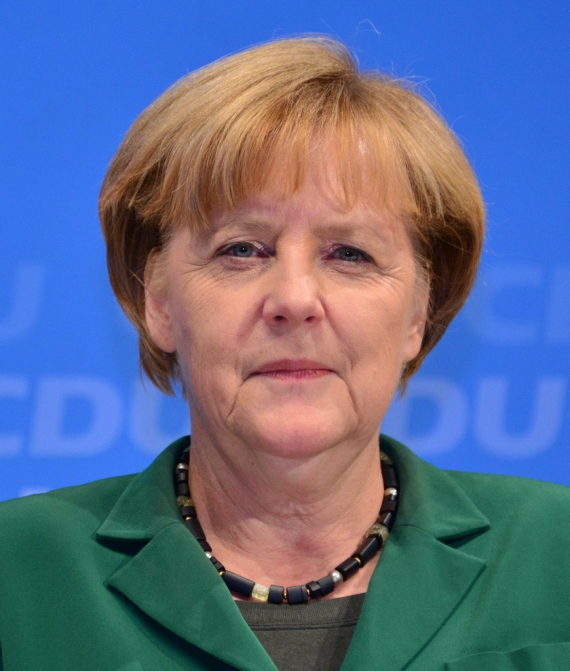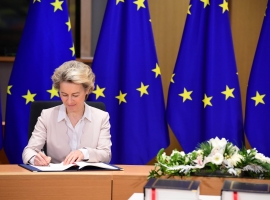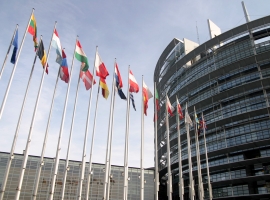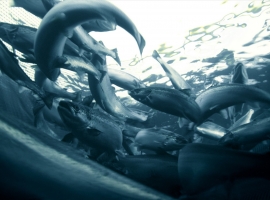
German Chancellor Angela Merkel was expected to press Greek Prime Minister Alexis Tsipras on Thursday to move faster to agree detailed economic reforms crucial to unlock international bailout funds before Athens runs out of cash.
The conservative German leader was due to meet the leftist Greek premier just before an emergency European Union summit on migration, a day before euro zone finance ministers meet in Riga to review progress -- or the lack of it -- in slow-moving negotiations between Athens and its creditors.
EU officials said they expected Merkel to deliver a message that she wants to keep Greece in the single currency area and avoid a catastrophic default, but to achieve that, Tsipras' government must make commitments in technical talks on detailed, costed measures to make public finances sustainable.
"At the highest level, the Germans want to keep Greece in the euro area and find a solution, but time is running short and there may have to be more drama before Tsipras can put his foot down and reach an agreement," one senior official said.
A Greek government official told Reuters in Athens that Tsipras would outline specific reforms to Merkel in a bid to appease creditors and is hoping she will intervene so that there is a breakthrough in the negotiations.
The chancellor has so far insisted it is up to Athens to satisfy representatives of the European Commission, the International Monetary Fund and the European Central Bank.
European Commission Vice President Valdis Dombrovskis, speaking in Berlin, said there were increasing doubts about the situation in Greece, warning that if financial instability returned, there would be no economic growth this year.
He said he no longer expected an accord this month but negotiations could run beyond an April 30 deadline for a deal and he expected agreement sometime during May. Given its tight cash position, Greece had reasons to speed up the talks and its reform plans.
"Progress is not good," he told ARD German television.
Greece has yet to agree with its partners on a comprehensive list of reforms to secure 7.2 billion euros remaining from its 240 billion euro EU/IMF bailout.
Euro zone and Greek officials said on Wednesday that Athens could probably scrape together public cash reserves to meet its payment obligations into June, but it faces a hump of bond redemptions to the ECB in July and August that it cannot meet without a fresh injection of funds.
The ECB's chief economist, Peter Praet, said the central bank was prepared to keep authorizing emergency lending to Greek banks for now because they were assessed to be solvent.
"It is true that it is a stressful situation," Praet said at an event in Berlin. "I'm not going to discuss how long this will go on. Verbal discipline is of the essence in crisis times."
The ECB agreed on Wednesday to raise the cap on emergency liquidity assistance to Greek banks to 75.5 billion euros and did not toughen the conditions on collateral they have to present for funding, banking sources said. The ECB's Governing Council is reviewing the Greek lending weekly.
Tsipras, elected in January on an anti-austerity platform, is resisting cutting pensions, liberalizing the labor market or raising value-added tax on Greek holiday islands.
EU officials said Brussels was pressing Athens to move ahead with other measures, such as a radical shake-up of product and service markets to sweep away privileges and protections for vested interests, as well as greater fairness in taxation to shift the burden to the better-off and improve collection.
They are also looking for progress on privatizations, which leftist ministers halted when they took office in late January.
Tsipras' office said he would also have a private meeting with French President Francois Hollande on the summit sidelines.
Greek daily Kathimerini reported that Athens is considering asking the euro zone's rescue fund to buy Greek government bonds held by the ECB to pay for debt redemptions due this summer.
"The aim of the government's plan is to have the European Stability Mechanism buy the bonds and reach a deal to repay them further out in time, as is the case with loans from the EFSF (European Financial Stability Facility)," the paper said without citing sources.
That would amount to a third Greek bailout requiring euro zone governments' agreement and parliamentary approval in some countries, such as Germany and Finland, which could only be achieved if there were a deal on a comprehensive reform package. (Reuters)
For more visit: www.businessworld.ie

















